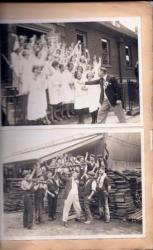
Collection of material relating to Captain Rex Davis's Conservative candidacy for the 'National Government' coalition in the Wednesbury By-Election, 1932. Including manuscript and typescript letters, telegrams, fliers, report and photographs.
108 items, in a variety of formats, and including 17 Autograph Letters Signed; 14 Typed Letters Signed; 47 telegrams (on 51 leaves), a 'Statement of Election Expenses', a mimeographed 'Agent's Report. Year 1932' (4to, first 3 pp only); 3 election fliers; an 'Admission Ticket' to Davis's 'Adoption Meeting'; a printed notice by Davis 'To All Primrose Leaguers'; and seventeen black and white photographs. All but a few items laid down in a folio cloth scrapbook by W. Straker Ltd, London. All texts clear and complete, with the collection in fair condition on aged paper. An interesting and evocative collection, casting light on the day-to-day business of British electioneering in the Great Depression. As the collection indicates, Davis was a likeable and larger than life figure. He served in the Royal Tank Corps, 1914-1918 (being awarded the Military Cross), and the Royal Armoured Division, 1939-1945. Following the elevation of the sitting Conservative member to the Earldom of Dudley, his adoption as Conservative candidate at the Wednesbury by-election was reported as follows in The Times, 11 July 1932: 'In consultation with party headquarters a candidate has been secured in Captain Rex G. Davis, of Richmond, Surrey, who played hockey for surrey and for the Army, and is a useful amateur boxer. The Wednesbury district, the home of the metal tube trade, has suffered greatly in the past from the dumping of foreign raw and finished material, and there are upwards of 5,000 unemployed [...] The "means test" is likely to play a big part in the campaign, and Captain Davis points out that the Socialists were the inventors of that scheme.' The election was keenly fought, and Davis attributed his defeat by the Labour candidate J. W. Banfield to 'gross misrepresentations made to the electorate on the question of the means test, adding that, with only three weeks in which to explain the true facts, he had not the time to dispel the fears created in the minds of the local unemployed' (Times, 28 July 1932). Davis's agent A. W. Allen (in his 'Report' below) attributed the defeat to the fact that 'the time was most inopportune', with the National Government 'doing work that was most unpopular but absolutely necessary to save the Country and lay a foundation for it's [sic] future prosperity'. The first item in the volume is Davis's 3-page 12mo election flier: 'Wednesbury Bye-Election, 1932 | Vote for Capt. Rex Davis, M.C. The National Candidate who stands for Wednesbury and Empire'. The flier is followed by the first of several communications to Davis from Conservative Party Vice-Chairman Captain Sir George Bowyer: a 'Personal & Private' Autograph Letter Signed (4to, 2 pp), 29 June 1932, in which he explains that he has 'suddenly had a brain-wave that you were probably the only man who could hold Wednesbury for us'. Other correspondents (encouraging Davis before the election and commiserating with him after his defeat) include Davis's agent A. W. Allen (who testifies to his 'regard and admiration'), and his backer James Groves of Heathfield Park; the Earl of Powis; Lord Stonehaven (Conservative Party Chairman); Godfrey Locker Lampson; David Margesson (Parliamentary Secretary to the Treasury); A. M. Lyons; W. J. Womersley; E. W. Easom and Reginald Bennett of the Primrose League; Ernest Brown. Eight of the photographs are 19 x 14 cm, and show what the Times (26 July 1932) described as Davis's 'cheerful and vigorous' campaigning style, with him surrounded by female factory workers, labourers and election workers in front of the 'Rex Davis Committee Room'. Another 23 x 18 cm print shows him in the centre of a group of men making 'poppies' for the Royal British Legion appeal. Loosely inserted are four family photographs, including one (15 x 21 cm) of Davis in military greatcoat and uniform.


